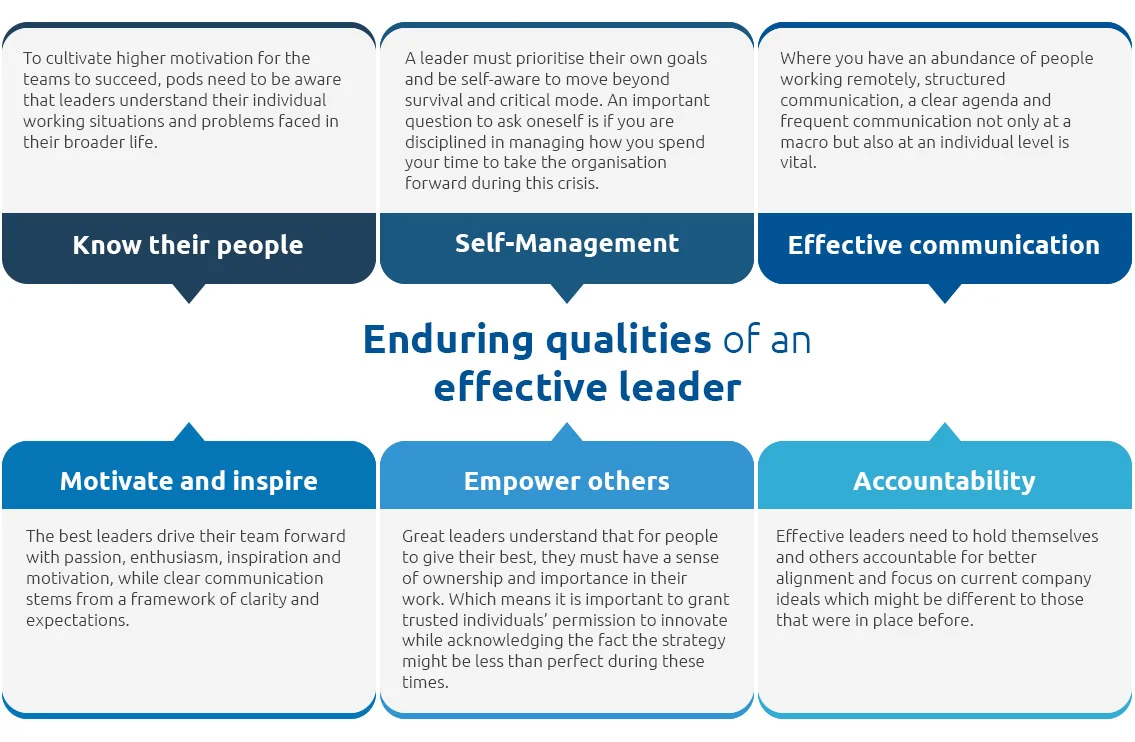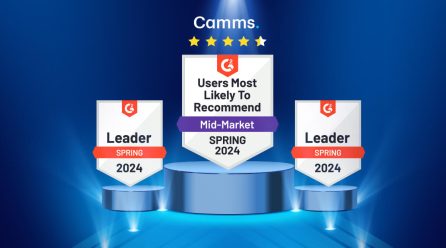What does it mean to be a leader in these uncertain times?
In times of uncertainty, the ability of an organisation to perform and thrive is heavily influenced by the qualities of its leaders.
Led by award -winning speaker Trudy MacDonald, our very first guest speaker session on cammscollege revolved around three key fundamentals that play a pivotal role in successful leadership in times of uncertainty.
- The role of a leader
- Focus & critical agility
- Accountability
The webinar offered a series of practical tips to leaders to help achieve a distinct shift in organisational performance and momentum moving forward. With an additional challenge being presented to leaders whose organisation’s performances have been great, to identify initiatives considered good/great previously which may no longer reflect the new ways of working today.
The right kind of leadership
Some key questions asked during this webinar were what it means to be a leader, especially in the context of todays’ environment?
In the pre COVID-19 world, a democratic style of leadership was often the norm to facilitate attention, engagement and development. With autocratic leadership being considered to be the least effective approach leading to a higher staff turnover, low engagement and motivation among staff.
Never the less in an interesting paradox, currently good leaders have opted for a more autocratic sense of leadership during these times, as teams require clear direction, and a stable framework to get behind.
Yet the best leaders have gone on to increase their democratic style of leadership within the confines of a tightknit group, whose members are invited to bring innovation to the table to help make informed decisions, which are then implemented autocratically through the rest of the organisation.

Business continuity planning
In this particular environment, business continuity planning requires 3 key considerations.
Priority 01 Survival
Regardless of where your organisation is on the survival journey, it is important to be anticipatory rather than reactive, by identifying trigger points for action. It is worth taking into consideration that by paying attention to the 3 phrases of planning; preparing, sustaining and reactivation, an organisation can emerge stronger than ever before.
When it comes to people and structural changes, some will be reactive and others strategic. Currently some of the best organisations are moving towards flatter structures by pulling the right talent throughout the organisation to do what needs to be done. Many organisations have also taken steps to limit hierarchy and beaucracy that may hinder decision making.
Through a survival perspective, many companies may have been forced to make redundancies, reduction of hours and salaries. A key message here is that redundancies are not the only option for your staff, Redeploying and realign the tasks to meet what your business needs right now is a great possibility to give thought to.
Priority 02 Reputation
Prioritizing your reputation during this period, with two key groups being the external market and stakeholders should be considered significant.
Now more than ever it is important to modify conversations with customers, stake holders, partners and suppliers to ultimately create value, so once we move to a stabilised environment, a trusted and enhanced relationship is sustained while protecting the organisations reputation. The same concept is applicable to your employees, it is important to ensure they are aware the organisation cares and interested in their well-being as opposed to being a company solely focused on organisational objectives during these truing times.
Priority 03 Laser Focus
As a leader it is important to understand what your business needs is to not only survive and but to also set yourself up to thrive. Having a structured plan that will enable you to identify and cascade your objectives tying in clear measures of success is critical.
Most organisations during normal times have a clear vision, mission and values in place, from which stems a strategic plan and an annual business plan that traditionally covers three years.
Yet during these times of uncertainty, it is quite likely that business as usual plans might have changed. Reframing this plan as a go forward plan spanning a contained period of time can help your organisation move forward while experiencing slow and steady incremental growth. On the other hand strategic priorities often seen as a revolutionary change, helps review what your organisation’s priorities are in times of crisis as the new normal continues to evolve.
Go forward plan
The Go Forward plan is a great example of how; leaders can take proactive steps to set the organisation up to thrive in uncertain times. While the vision, mission and purpose of an organisation may remain unchanged, it’s imperative for its strategic focus to remain viable while embracing opportunities presented by the ongoing crisis to strengthen teams, business and capabilities in a bid to accelerate future successes.
Clarity is critical if you need teams to be accountable when it comes to the behaviours we expect from people. The pace in activity and change have currently ramped up with active collaborations and engagement. Give people permission to innovate and work in the new ways you want them to work which ultimately leads to staff embracing an enhanced work culture.
cammstrategy by CAMMS in particular offers a system of real time reporting, and a logical cascade that harnesses strategy, the way forward to what individuals need to be doing all in one umbrella for a tangible sense of accountability.
Personal 30/60/90-day plans
Analyse the work that everyone is doing to identify of your great, good and poor work and missing actions by having a personal 30-day plan, which allows individuals to have a clear comprehension on what their key focus for the next 30 days are. Ideally 60 or 90 day plans seem more viable, given the uncertainty and changing environment, shorter delivery cycles offer absolute clarity.
The big picture being that an accountability framework gives purpose which is critical for engagement and motivation so staff are focused in delivering what is needed by leaders.
It’s important to remember that strategy might not be the finest during these times, yet when leaders implement discipline, structure and accountability, organisations can stay nimble and agile while being responsive to arising opportunities.
Accountability cadence
Having regular cadence or accountability meetings are crucial and can be greatly advantageous once consistency is achieved with the right agenda and manager training in place. A powerful activity, a leader can do is to bring your teams together with either daily or weekly stand up meetings which are more focused and shorter lasting up to no more than 15 minutes. With five key agenda items, depending on where your workforce is be it remote or in person, Key agenda items include good news or gratitude statement for a positive mindset, focus for the day, metrics which are critical for the business and what do I need help segment to eliminate unwanted emails and conversations, and finally a what has changed from yesterday item.
When it comes to ensuring better accountability, teams and staff need to cultivate a positive mind set to stay engaged with the tasks. The PERMA model in psychology can be applied in this instance to cultivate positive emotions, engagement either via video calls or in person for a more authentic connection. While positive relations help teams gain a sense of meaning in their work, accomplishment and achievement, when their wins are called out and celebrated.
Engage & Inspire
One on one engagement is critical to make sure people feel valued and appreciated, which in turn inspire higher levels of performance and productivity. Yet also taking steps to initiate interactive activities are equally important during these times, especially if your workforce has shifted to working remotely. So that when things go back to normal, in whatever form it maybe it is, your organisation’s culture is not siloed and diminished, only enhanced and better equipped to face a crisis.




